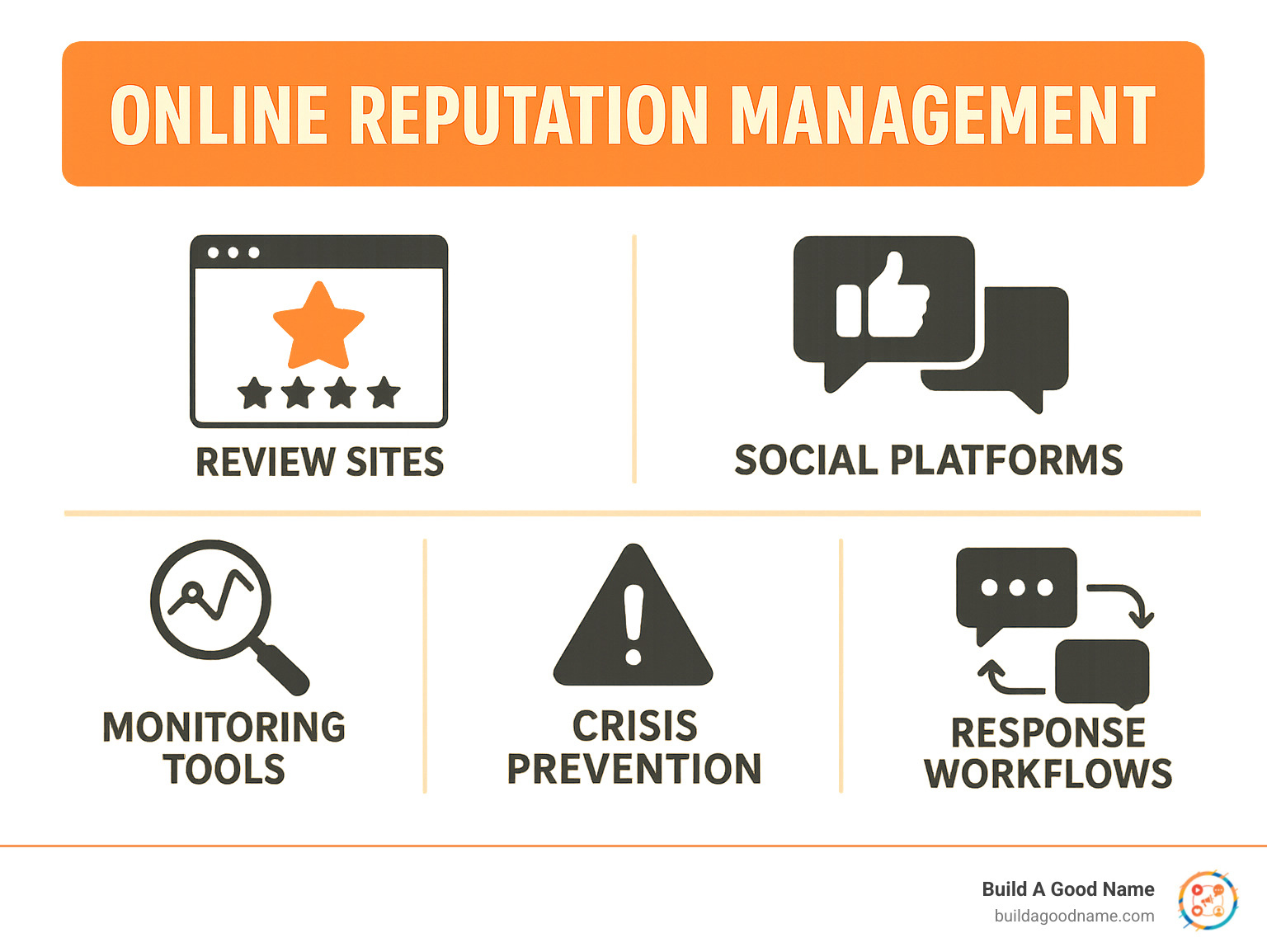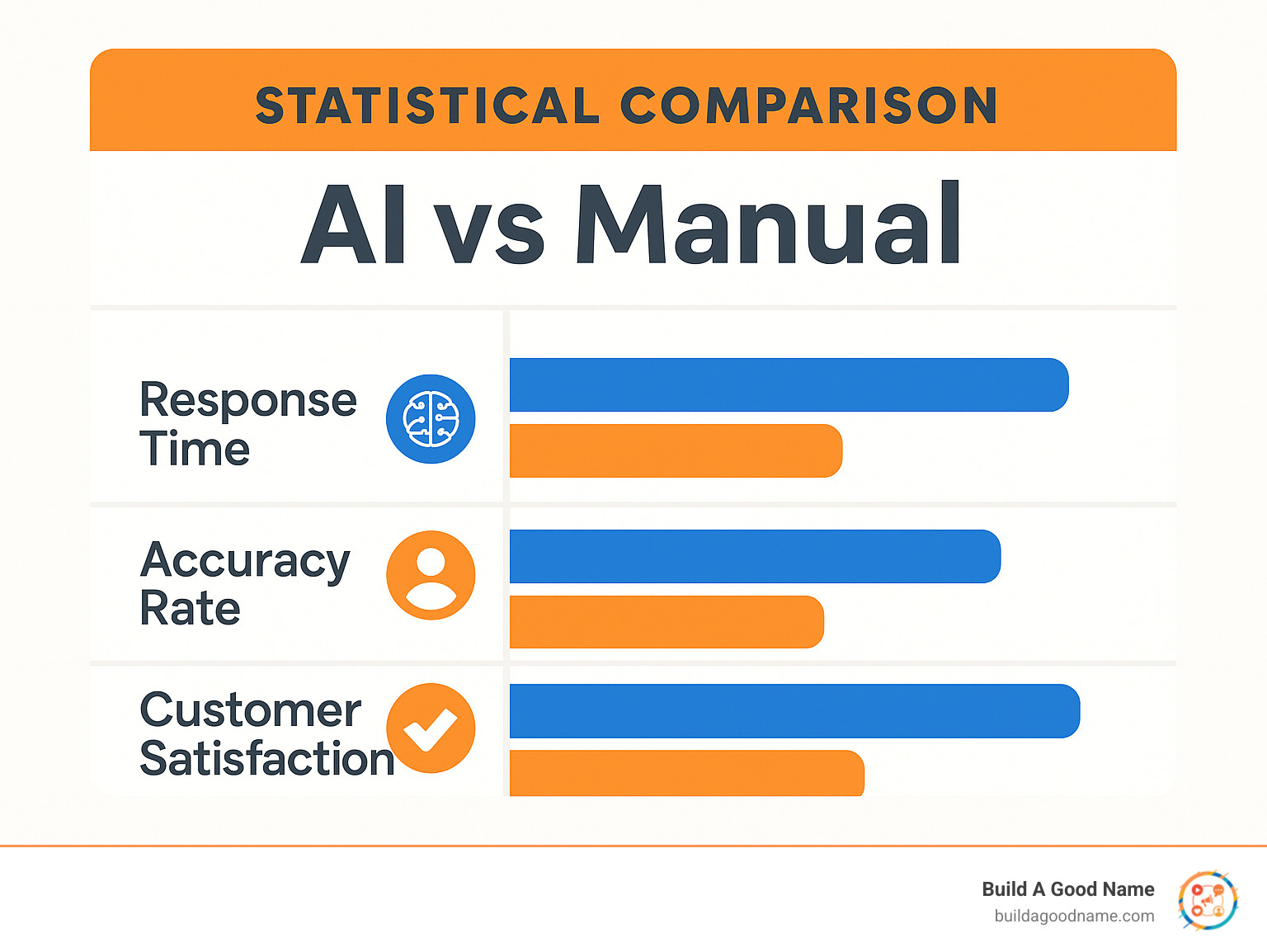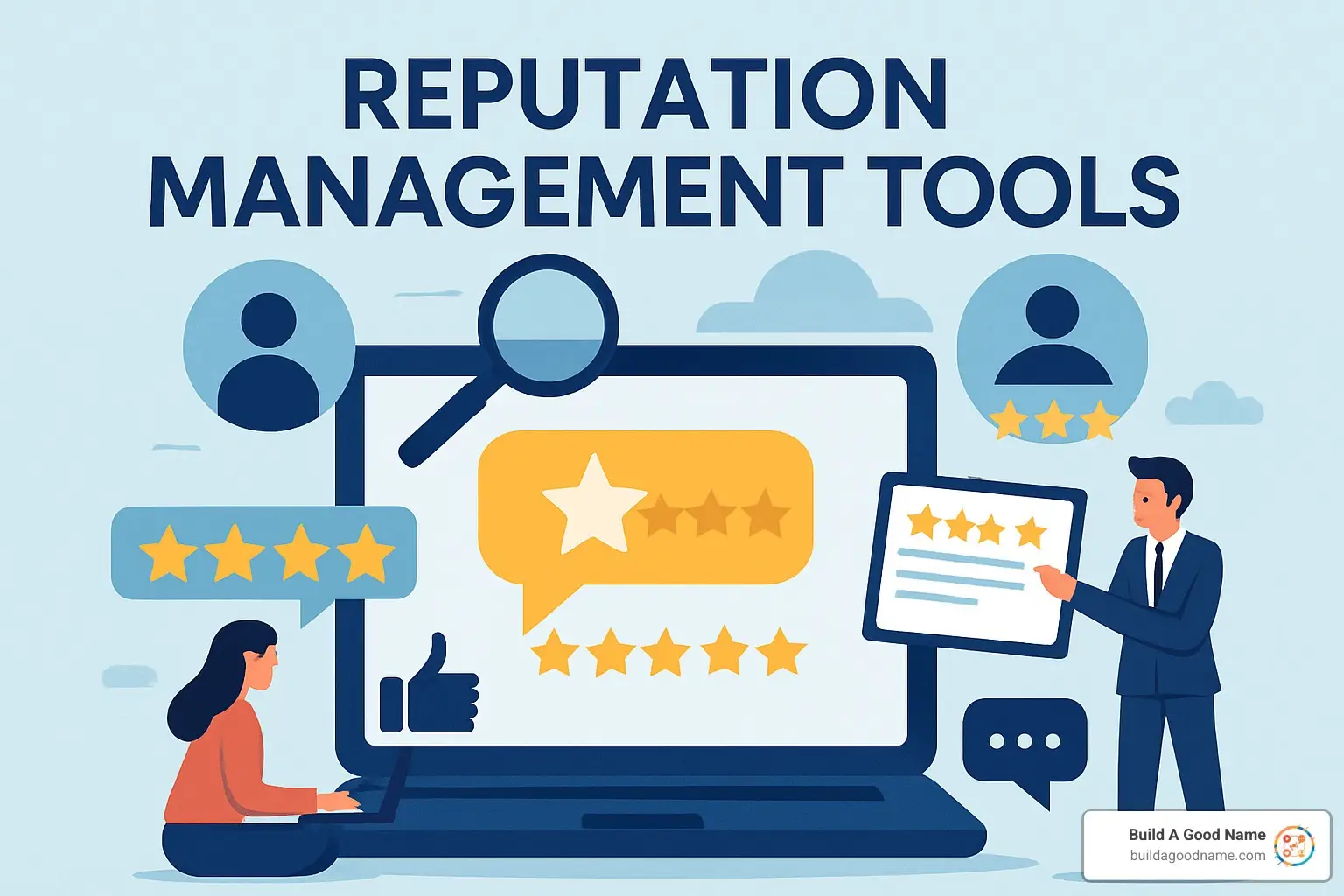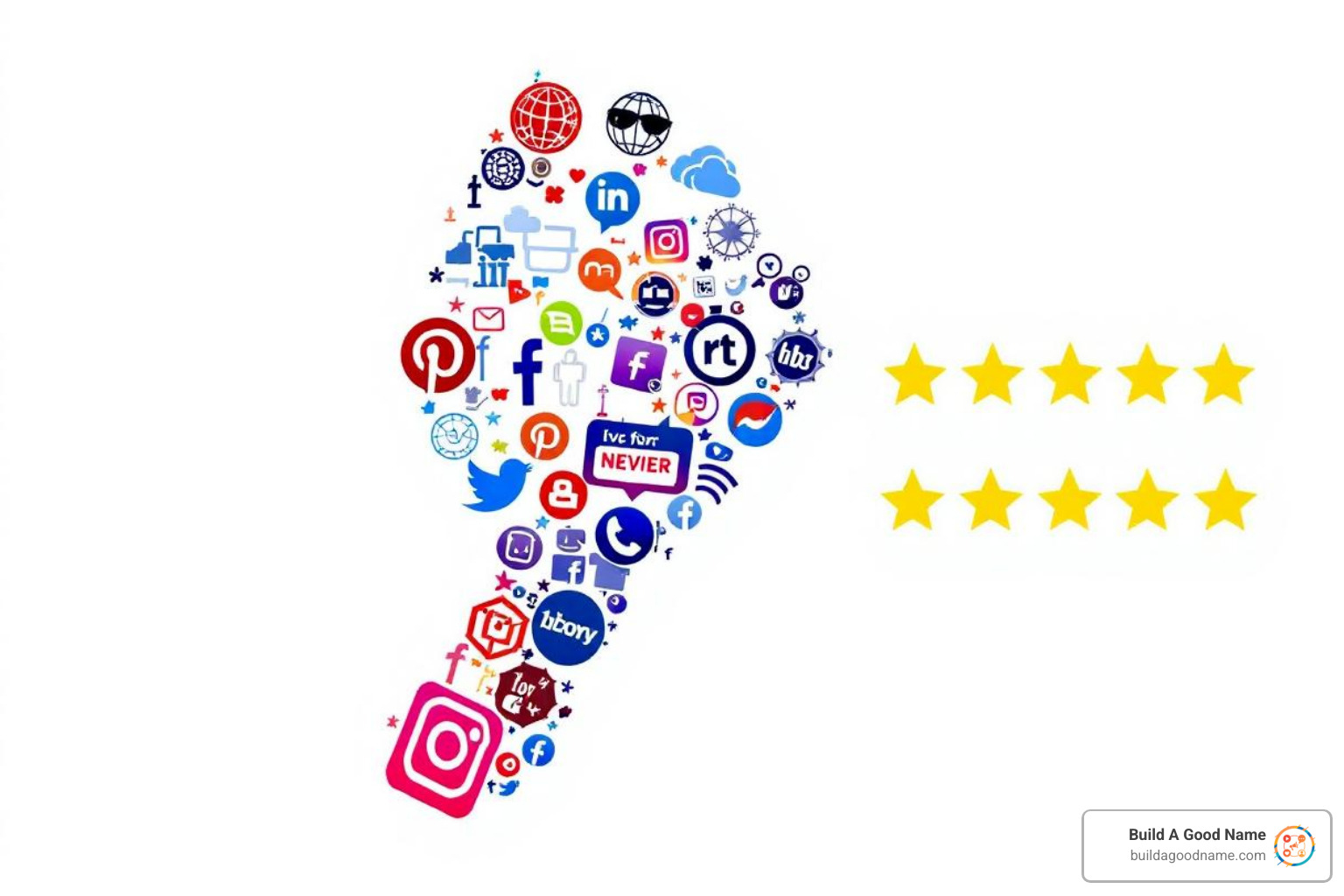Why Your Online Reputation Matters More Than Ever
Reputation management tools are software platforms that help businesses monitor, manage, and improve their online presence across review sites, social media, and search results. These tools automatically track mentions, analyze sentiment, and streamline responses to customer feedback.
Your business reputation lives online now. Almost 70% of shoppers read 1-6 reviews before buying, according to recent research. One viral complaint can tank your sales overnight. But here’s the good news: the right tools can turn customer feedback into your biggest growth engine.
Think about it – you’re already getting reviewed on Google, Facebook, Yelp, and dozens of other sites. The question isn’t whether people are talking about your business online. They already are. The question is whether you know what they’re saying and can respond fast enough to protect your brand.
Modern reputation management tools use AI to monitor hundreds of review sites, social platforms, and news sources simultaneously. They send instant alerts when new reviews appear, suggest personalized responses, and even predict potential PR crises before they explode.

Why Your Brand Needs Online Reputation Management
Your customers are talking about your business right now. They’re sharing experiences on Google Reviews, posting photos on Instagram, and discussing your service in Facebook groups. The question isn’t whether this conversation is happening – it’s whether you’re part of it.
Here’s the reality: 75% of employers Google candidates before hiring them. If potential employers are doing this much research, imagine what your customers are doing before they spend their hard-earned money with you. They’re reading reviews, checking social media posts, and asking friends for recommendations.
42% of adults research service providers online before making any purchasing decisions. That means nearly half your potential customers have already formed an opinion about your business before they ever walk through your door or visit your website.
The numbers get even more striking when you look at the bigger picture. Latest research on social-media growth shows millions of people join social platforms every single day. Each new user represents another person who might find, discuss, or review your business online.
Your digital footprint extends far beyond your website. It includes every Google review, Facebook comment, Yelp rating, and forum mention that includes your business name. This creates an incredible opportunity to build trust and attract customers – but it also creates serious risks if negative content goes unnoticed.
Reputation management tools help you stay on top of this constant stream of feedback. Instead of manually checking dozens of sites every day, these tools automatically monitor mentions and send you alerts when new reviews appear.
The Cost of Neglecting Reviews
Ignoring online reviews isn’t just bad customer service – it’s expensive. We’ve watched businesses lose thousands of dollars in revenue because they didn’t know about negative reviews until it was too late to fix the damage.
Consider this sobering fact: one negative review can cost you up to 30 customers. If you’re a restaurant with $50 average orders, that single bad review just cost you $1,500 in lost sales. Multiply that across Google, Yelp, Facebook, and other review sites, and the financial impact becomes frightening.
The speed of your response matters more than you might think. Scientific research on brand crises reveals that businesses without proper monitoring systems take 3-5 times longer to identify and respond to negative incidents. By the time they notice the problem, angry customers have often shared their frustration with friends, family, and social media followers.
Viral incidents can destroy years of hard work in just a few hours. We’ve seen local businesses face boycotts because a single customer complaint gained traction on social media. The business owners had no idea anything was wrong until customers stopped coming and their phones started ringing with angry calls.
But here’s what makes this even more challenging: negative content often ranks higher in search results than positive content. When someone searches for your business name, that one-star review might appear before your beautiful website or glowing testimonials.
The good news? Reputation management tools can prevent most of these disasters. They send instant alerts when new reviews appear, suggest response templates, and help you address problems before they spiral out of control.
Reputation Management Tools: How They Work & Key Features
Think of reputation management tools as your business’s digital watchdog. They’re constantly scanning the internet, looking out for any mention of your brand while you focus on running your business. It’s like having a dedicated team member whose only job is to keep tabs on what people are saying about you online.
These smart platforms work by continuously monitoring hundreds of online sources – from Google reviews and Facebook posts to news articles and industry forums. They don’t just find mentions of your business; they also figure out whether people are saying good or bad things about you.
The real-time alert system is where things get interesting. Imagine getting a text message the moment someone leaves a review, positive or negative. That’s exactly what happens. You can customize these alerts to notify you about specific keywords, competitor mentions, or when sentiment drops below a certain threshold.
Automated response workflows take the heavy lifting out of managing customer feedback. Instead of scrambling to write replies from scratch, these tools offer smart templates and even AI-generated responses that match your brand voice.
| Manual Monitoring | Automated Tools |
|---|---|
| Check 5-10 sites daily | Monitor 200+ sites continuously |
| Miss 80% of mentions | Catch 95%+ of mentions |
| 2-3 hours daily | 15 minutes daily |
| React to crises | Prevent crises |
| Limited insights | AI-powered analytics |
The difference between doing this manually and using reputation management tools is like comparing a bicycle to a sports car. Manual monitoring means you’re probably missing most of what’s being said about your business, while automated tools catch almost everything.
For a deeper dive into choosing the right platform for your needs, our guide on Review Management Software breaks down all the technical details.
Core Functions Every Tool Must Offer
When you’re shopping for reputation management tools, there are five must-have features that separate the good from the great.
Comprehensive monitoring means the tool watches everywhere your customers might be talking. This includes obvious places like Google and Facebook, but also industry-specific sites, local directories, and even news outlets.
Smart response workflows should feel like having a personal assistant for your online reputation. Look for customizable templates, approval processes for sensitive situations, and automatic routing that sends different types of feedback to the right team members.
Detailed reporting and analytics help you spot patterns and track improvement over time. You want to see metrics like review volume, average ratings, response times, and sentiment trends.
Seamless integrations with your existing systems save time and prevent information from falling through the cracks. The tool should connect with your CRM, email platform, and customer support systems.
Enterprise-grade security protects your customers’ information and keeps you compliant with privacy regulations.
Must-Have AI Improvements in reputation management tools
Artificial intelligence has completely changed the game for reputation management. These aren’t just fancy bells and whistles – they’re practical features that save time and improve results.
Automated response generation creates personalized replies that actually sound human. The AI analyzes each review’s specific concerns and crafts responses that match your brand voice.
Multi-language translation breaks down language barriers instantly. Whether you’re dealing with Spanish reviews in Miami or French feedback from Montreal, the AI translates everything in real-time.
Predictive crisis detection is like having a crystal ball for your reputation. The system learns to recognize patterns that typically happen before major reputation problems explode.
Advanced sentiment analysis goes way beyond simple positive or negative ratings. Modern AI can detect specific emotions like frustration, excitement, or disappointment.
Our article about Automated Review Replies explores how automation can transform your entire review management process.

2024 Guide: Matching Tool Types to Business Needs
Choosing the right reputation management tools isn’t a one-size-fits-all decision. Your business size, industry, and specific challenges should guide your selection process.
Small and medium businesses usually thrive with straightforward platforms that don’t require extensive training. These companies often prefer tools that bundle reputation management with other marketing features.
Enterprise companies need advanced analytics that can slice and dice data across departments, sophisticated reporting for C-suite presentations, and tools that integrate with existing enterprise software.
Multi-location businesses face unique challenges. They need to monitor each location individually while maintaining centralized control.
Digital marketing agencies require specialized features that let them manage multiple clients efficiently. They need white-label solutions that make them look like reputation management experts to their clients.
Best reputation management tools for local businesses
Local businesses have a special relationship with their communities. Your customers aren’t just numbers in a database – they’re neighbors, friends, and familiar faces.
SMS-based review requests work incredibly well for local businesses. People are more likely to respond to a text message than an email, especially when it comes from a business they just visited.
Local listings management keeps your business information consistent across dozens of directory sites. Nothing frustrates customers more than driving to your old address or calling a disconnected phone number.
Point-of-sale integration lets you request reviews automatically when customers complete purchases. The timing is perfect because their experience is fresh in their minds.
QR code campaigns make leaving reviews incredibly easy. Customers simply scan a code with their phone and they’re taken directly to your review page.
For detailed strategies custom to local markets, check out our guide on Review Management for Local Businesses.
Best reputation management tools for enterprises
Enterprise reputation management tools must handle complexity that would make smaller platforms buckle under pressure.
Advanced analytics and reporting provide the kind of insights that executives need to make million-dollar decisions. These platforms track metrics like share of voice, competitive positioning, and brand health scores across different regions and product lines.
Cross-department collaboration becomes critical when you have marketing teams, customer service departments, and PR agencies all working on reputation management.
API integrations connect reputation management with existing enterprise systems seamlessly. Your CRM talks to your reputation platform, which talks to your customer service software.
Compliance and security features meet the strict requirements that enterprises face. This includes GDPR compliance for European operations and industry-specific regulations.
Best reputation management tools for agencies
Digital marketing agencies juggle multiple clients while trying to prove their value every single month.
White-label dashboards let agencies brand the interface with their own logos and colors. Clients see a professional, cohesive experience that reinforces the agency’s expertise.
Multi-client management streamlines workflows so account managers can switch between client accounts quickly.
Detailed ROI reporting helps agencies justify their services and retain clients long-term. The best reports show clear connections between reputation management activities and business outcomes.
Advanced Strategies: AI, Automation & Crisis Prevention
The smartest reputation management tools work like crystal balls for your business. Instead of scrambling to fix problems after they explode, these advanced platforms spot trouble brewing and help you stop it before it starts.
Modern AI doesn’t just monitor what people are saying about your business. It actually learns patterns from millions of conversations to predict what might happen next. When proactive monitoring detects unusual patterns – like three customers mentioning slow service in one day – it raises a red flag before those complaints turn into scathing online reviews.
Automated workflow triggers act like your business’s nervous system. The moment something concerning happens, the system springs into action without human intervention. A negative review might automatically alert your customer service team, create a support ticket, and even draft a personalized response for your approval.
Sentiment trend analysis works like a mood ring for your business. It tracks how customers feel about you over time, not just what they say. You might notice satisfaction dropping weeks before it shows up in your star ratings.
Using reputation management tools to benchmark competitors
Your reputation doesn’t exist in a vacuum. Customers constantly compare you to other businesses in your area and industry. Reputation management tools help you understand exactly where you stand in that comparison.
Share of voice analysis shows how much of the online conversation belongs to your business versus others. If you’re only capturing 10% of discussions in your industry, there’s huge room for growth.
Star rating gaps reveal golden opportunities hiding in plain sight. Maybe your competitors consistently get dinged for poor communication while you excel at keeping customers informed.
Review volume trends tell a story about who’s actively engaging with customers and who’s coasting. Businesses that consistently earn new reviews typically rank higher in search results and win more customers.
Stopping a Crisis Before It Starts with reputation management tools
The best reputation crisis is the one that never happens. Advanced reputation management tools work like smoke detectors for your business reputation – they sound the alarm while you still have time to prevent real damage.
Early warning systems watch for specific danger signals that typically precede major reputation problems. A sudden spike in negative mentions, multiple complaints about the same issue, or social media posts gaining unusual traction all trigger alerts.
Automated escalation rules ensure the right people get involved immediately when potential crises emerge. A health code complaint at a restaurant might instantly notify the manager, health department liaison, and PR team.
Real-time collaboration tools keep everyone on the same page during fast-moving situations. Team members can share updates, approve responses, and coordinate actions from anywhere.
The key is catching problems while they’re still small and manageable. A single unhappy customer posting on social media is easy to handle with a thoughtful response and genuine effort to make things right.
For practical tips on handling negative feedback effectively, check out our guide on Responding to Google Reviews.
Frequently Asked Questions about Reputation Management Tools
What are reputation management tools and why should I invest in one?
Reputation management tools are like having a 24/7 digital assistant watching over your business reputation. These software platforms automatically scan the internet for mentions of your business across review sites, social media, news outlets, and other online channels – then help you respond quickly and effectively.
Think about it this way: every day, potential customers are Googling your business, reading reviews, and making decisions about whether to buy from you. Without these tools, you’re essentially flying blind. You might find a scathing review weeks after it was posted, when the damage is already done.
The numbers tell the story. Manual monitoring means you’ll miss about 80% of online mentions about your business. Meanwhile, almost 70% of shoppers read reviews before making purchasing decisions. That’s a lot of missed opportunities and potential reputation threats slipping through the cracks.
But here’s the exciting part – businesses using reputation management tools typically see dramatic improvements. Many report significant increases in review volume and positive review shares. When you make it easier for happy customers to leave reviews and respond thoughtfully to concerns, good things happen.
How do AI and automation make these tools more effective?
AI transforms reputation management from a reactive scramble into a proactive strategy. It’s like upgrading from a bicycle to a sports car – you can go faster, farther, and handle more complex terrain.
Speed makes all the difference. While you’re sleeping, AI is monitoring thousands of sources and can draft responses to new reviews. Human teams simply can’t match this 24/7 coverage and instant response capability.
Personalization at scale is where AI really shines. Instead of generic “thank you for your feedback” responses, AI analyzes each review’s specific content and creates responses that address the customer’s exact concerns.
The predictive capabilities are perhaps most valuable. Machine learning spots patterns that humans miss – like multiple customers mentioning similar problems before they explode into a reputation crisis.
Language barriers disappear with AI translation, letting you manage reputation across different markets without hiring multilingual staff.
What’s the best practice for responding to negative reviews quickly?
Speed is your secret weapon here. Aim to respond within 24 hours maximum, but a few hours is even better. Quick responses show other potential customers that you actually care about feedback and take concerns seriously.
Here’s the approach that works best: Start by acknowledging the customer’s experience and thanking them for taking time to share feedback. Then apologize appropriately – take responsibility for legitimate issues without getting defensive or making excuses.
Offer specific solutions rather than vague promises. Instead of “we’ll do better,” try “I’m personally ensuring our manager reviews our checkout process to prevent this delay from happening again.”
Move complex conversations offline by inviting the customer to call or email directly. This prevents public back-and-forth exchanges and shows you’re committed to real resolution.
Never argue or get defensive in your public response. Hundreds of future customers will read your reply. They’re not just judging how you handled this customer’s problem – they’re imagining how you’d treat them if something went wrong.
Conclusion

Reputation management tools have evolved from nice-to-have monitoring systems into essential business infrastructure. In 2024, these platforms combine AI-powered automation, predictive analytics, and comprehensive monitoring to help businesses not just protect their reputation, but actively build stronger customer relationships.
The key is selecting tools that match your specific needs:
- Local businesses should prioritize SMS review requests, local listings management, and easy-to-use interfaces
- Enterprises need advanced analytics, multi-department collaboration, and robust security features
- Agencies require white-label solutions, multi-client management, and detailed ROI reporting
Reputation management is not about hiding negative feedback – it’s about engaging authentically with customers, addressing legitimate concerns quickly, and building trust through transparency.
At Build A Good Name, we understand that every business deserves a reputation that reflects the quality of their products and services. Our AI-powered platform helps local businesses automate review collection, generate personalized responses, and showcase positive feedback effectively.
The businesses thriving in today’s digital landscape aren’t necessarily those with perfect products – they’re the ones who listen to customers, respond quickly to concerns, and continuously improve based on feedback. The right reputation management tools make this possible at scale.
Ready to take control of your online reputation? The tools and strategies we’ve outlined here will help you build a brand that customers trust, competitors respect, and search engines reward. Your reputation is too important to leave to chance.
For more insights on building a strong online presence, explore our comprehensive guide on reputation management for growing online presence.



